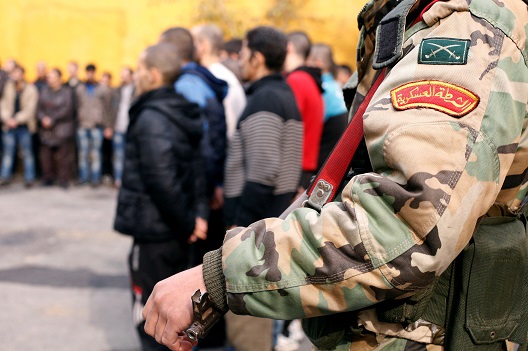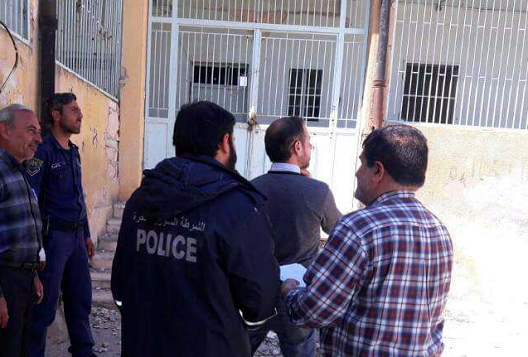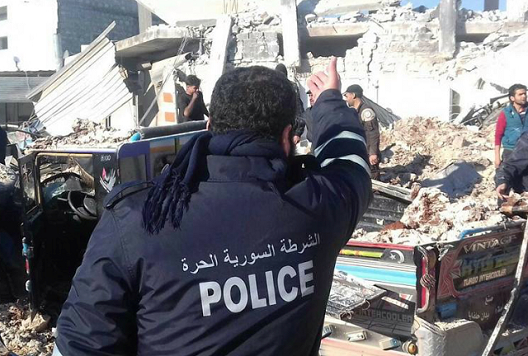 The Syrian revolution has been, at least in part, a consequence of demands for a more transparent rule of law based on trust and legitimacy.
The Syrian revolution has been, at least in part, a consequence of demands for a more transparent rule of law based on trust and legitimacy.
Under the dictatorship of Hafez al-Assad and his son Bashar, the police and the internal security acted as tools to quell activism and discontent. Four main security services collectively known as the ‘Mukhabarat’ supported a rule of religious, civic, and ethnic marginalization: Department of Military Intelligence, Political Security Directorate, General Intelligence Directorate, and the Air Force Intelligence Directorate. Today, many Syrians still perceive these institutions as symbols of state patronage and oppression.
Expressing a deep resentment of an unrepresentative government, Syrians now demand a visible political and legal system. Developing a more just legal system that sets the ground work for broader and more long-term reforms can start now – even before the end of the war – with the creation of a civilian police force. This police force should encapsulate different religious, ethnic, gender, cultural, and local groups as an enforcement mechanism alongside a governing legal structure.
Any transitional government tasked with instilling Syria’s new justice mechanisms will likely be under-resourced and over-whelmed. Extensive civilian displacement and the destruction of state infrastructures have created a power-vacuum where dissident armed groups rule in the absence of a centralized authority. As a result, the judicial structures in rebel-held territories are ad hoc and informed by the prevalent armed group controlling the region, and the conflicting interpretations of Sharia doctrines by rebel groups make any movement towards holistic justice mechanisms extremely problematic.
Justice reform cannot take place in isolation. Collaboration with local actors should be targeted as a key means of delivering responsive and accountable justice services able to facilitate discussions that engage the entire community. Such avenues present great opportunities for change, and Community Security Working Groups (CSWG)s or local forums, create an important environment for community-police dialogue and the joint management of security provisions. For the last three years, the British government implemented successful initiatives in justice programming across Idlib, Aleppo, and Daraa provinces through such methods. This programming supported moderate opposition groups in delivering effective, responsive, and accountable security and justice services to improve communities. Citizens were able to articulate requirements for street lighting and night patrols; request greater traffic and road safety regulations and highlight the importance of the police in the prevention of theft and looting, when aerial bombardment and shifting conflict lines forced residents to flee their homes.
Vulnerable groups must also be included in this process. Women constitute forty-nine percent of the Syrian population, but four times the unemployment rate as men. The Syrian conflict has seen high levels of violence and abuse targeting women, including rape as a tool for war. Consideration should be given to the participation of women in both the CSWGs and the police force. Furthermore, this should include women community police officers as an integral part of justice provision and their roles should not be constrained to secretarial or administrative positions. The autonomous region of Rojova in northern Syria demonstrated the benefits of the inclusion of women in security services – over twenty-five percent of the Asayish police force are women and their effectiveness in operations against the Islamic State and to the security requirements of society is well established. The emphasis on gender inclusion enables effective investigations by local police forces and re-focuses on gender based violence in the community. Victims are more willing to report abuses and crimes of sexual assault with perceived equal representation in security services.
The Syrian population remains diverse in religious and ethnic groups with Sunni Muslims, Druze, Alawites, Ismalis and Christian communities from a wide range of integrated nationalities, including Iraqis, Palestinians, Assyrians, Kurds, Armenians, Circassians, and Turkmen. It is crucial that these social groups are governed by a consistent and ethical system to ensure a justice provision that Syrian society recognizes. This encourages local ownership of the justice service and encourages the Syrian public to perceive the police as a means of protecting the people of Syria, rather than the government.
While notarial and civic documentation services play an important role, accountability beyond the documentation of human rights violations is crucial for post-conflict reconciliation and justice. The police are a key mechanism in seeking accountability, empowering victims, and providing a platform for both sides in the conflict. Any peace agreement to come is unsustainable without this process and requires consistency for effective mitigation in conflict resolution.
(photo provided by author)
It is equally crucial to combine both a bottom-up and top-down reform process to bridge the disconnect between local, regional, and national justice mechanisms. This is central to ensuring a durable and sustainable end-product, with or without continued foreign aid and investment. Train and equip programs implemented in isolation from other interventions failed to promote structural stability and left Syrian security sectors absent a capable and independent governance capacity.
Local councils in Idlib and Aleppo provinces are effective partners in the implementation and development of local justice and policing initiatives due to effective governance and administrations. Like many Westernized policing models, local councils have the potential to encourage civic jurisprudence and provide oversight of justice mechanisms, to reinforce the legitimacy of local governance institutions, and hold the police and judiciary to account. To enable this process, justice programming should endeavor to identify local and professional judicial partners to support local police forces, such as judges, lawyers, and politicians, who are familiar with the Syrian context and legal environment. 
(photo provided by author)
There are however, some limitations to these processes that must be considered. Firstly, many justice and security initiatives are dependent on the tolerance of local militant groups to be effective. Equal consideration must also be given to the legitimacy of the structures being supported both in terms of community support and formal legal foundations. Often donor communities or secretariats will abide by the ‘red-lines’ of their governments and refuse to collaborate or operate in the region where various armed groups maintain a presence.
Furthermore, the deconstruction and reformation of a policing system where justice remains arbitrary and accountability selective, if at all; presents a significant challenge in rebuilding public trust. The recruitment and selection of any police officers must be undertaken with extensive care and due diligence, and utilize any vetting or verification processes available. The legitimacy of the police is vital in validating the credibility and authority of its representatives to address complex and diverse needs of the area. Police officers should be recruited from their local communities to utilize pre-existing social ties. This tactic is effective in garnering positive public favor to challenge the norms of violence and impunity that flourished and destabilized societies across the region under Baathist doctrines since 1970.
Reforming political apparatuses and security services is not easy anywhere let alone within Syria. A future police force must be a justice mechanism for all Syrians. It is unlikely that applying a single model of governance will adequately address the deep ideological divisions and unique religious and social contexts across the region. Turbulent politics, persistent political violence, and weak institutional capacity remain significant obstacles.
However, the foundations must be established now for future accountability. As regime institutions are destroyed, new ones must replace them. Building a legitimate, effective, and accountable justice framework will play an important part in establishing a durable and lasting peace to break a cycle of state abuses and impunity. This will require a significant change in Syrian society, politics, and governance; it will ultimately necessitate a process of reconciliation and relationship building where the norms of violence are overhauled and replaced with foundations of trust and confidence.
Ross Longton is a justice, security, and peace-building specialist who focuses on governance reform and capacity building across the Middle East and North Africa. A former junior detective from Scotland, he has spent the last two years providing support and capacity-building to the Free Syrian Police in Aleppo and Idlib.
Image: Photo: A member of the government military police stands guard as men, who were evacuated from the eastern districts of Aleppo, are being prepared to begin their military service at a police centre in Aleppo, Syria December 11, 2016. REUTERS/Omar Sanadiki
